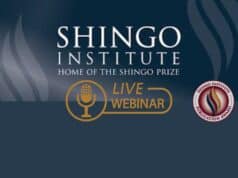Thanks as always to Ryan McCormack for this… there's always so much good reading, listening, and viewing shared here by him!
Insights about improvement, innovation, and leadership…
Operational Excellence, Improvement, and Innovation
Lean Perennials vs. Lean Millennials
Work has changed a lot over the last several generations. So has the thinking about how to improve work. Modern management has proven to be a “hardy perennial” but so has Lean Thinking. Jim Womack shares his perspective on lean over four generations and what the future has in store.
The Invisible System
I worked in healthcare for years. I naively believed that we could “kaizen” our way to a better system. We can't.
“Systems almost never change voluntarily. They rarely change because some of the participants in the system decide that they would prefer new rules. Systems change when their inputs change and when the rules change.” Seth Godin reminds us that systemic problems require systemic solutions.
Gold Processes?
Process mining software is becoming more available as it becomes commoditized (the algorithms are all basically the same). Here are Gartner's latest reviews on Process Mining software.
I've been bullish on the potential for process mining as a helpful diagnostic and process visualization tool, especially in highly digital and transactional process environments (e.g. fintech, back-office, supply chain, call centers, etc.), but there is no substitute for understanding the actual work. Process mining uses event data about the work, but is not truly representative of critical factors related to the work, for example, the working conditions, the knowledge of the worker, any work happening “outside” of the digital system, and many others.
If you're going to mine, you will still need to get dirty. Go to the source to validate the data and understand the actual work. It is where the real gold lies.
A Few Quick Quotes


Creating a Culture of Improvement
One does not simply…
“When will the new culture be implemented?”. Culture is emergent and complex – it is not a program that you implement. Roger Martin reminds us that changing culture is about changing the way individuals work together, especially leaders. When it comes to changing culture, think small.
Find out what it means to me (and your employees)
Respect for people is foundational to Operational Excellence but it is often ignored when the labour market is plentiful with job-seekers. The bad news for such organizations: it's an employee market right now. People have more choices and a preference for less toxic cultures. Feeling disrespected at work has the largest negative impact on an employee's overall rating of their corporate culture of any single topic. Treating people with respect has no downside. The opposite is not true.
Psychological safety takes a long time to cultivate and can be destroyed with only a few words from the manager. What not to say as a manager.
All I know is that I don't know
Leading with humility is a key principle for creating a culture of improvement. Humility helps engage others in solving problems and promotes learning. But how humble are you? Take this Intellectual Humility Quiz to find out.
Coaching – Developing Self & Others
You can get with this AND you can get with that
We are wired to think of problems as either/or. This creates false tradeoffs, limits the boundaries of problems and forces us to zero in on a narrow set of solutions right away. Framing problems as both/and can create useful tension while expanding the boundaries of a problem. “Do we want to offer either a faster customer response or a better customer experience?” becomes “How do we offer both a faster customer response and a better customer experience?”. Decisions don't have to be either/or.
Focus on Change Management
In today's world, all management is change management. The days when change was treated as an “event” have been replaced by a workplace where change is a constant. Managing change is now the essence of a management job.
Looking for some great tools and resources on change management? Check out Prosci Change Management Downloads. Prosci offers excellent training for all levels.
Looking for some free, high-quality training?
There are some great courses on change management on Coursera and I have completed several of them.
- For beginners, I recommend Removing Barriers to Change from the University of Pennsylvania. A 6-hour course on the psychology of change with very practical tips and strategies to reduce common barriers to change.
- For folks who are leading many changes in the workplace I recommend Leading Transformations: Manage Change from Macquarie University. It's more comprehensive and takes about 15 – 20 hours to complete, but I found it to be worth it for anyone whose role consists of managing large-scale changes.
Case Study
It's hard to have effective process improvement without effective change management. Transformation leaders at Asahi share some valuable insights and challenges from their recent efforts including the need for transparency, inclusion, agility, and communication in this video.
Follow Ryan & Subscribe:
LinkedIn: https://www.linkedin.com/in/rjmccormack/
Subscribe to receive these via email
What do you think? Please scroll down (or click) to post a comment. Or please share the post with your thoughts on LinkedIn – and follow me or connect with me there.
Did you like this post? Make sure you don't miss a post or podcast — Subscribe to get notified about posts via email daily or weekly.
Check out my latest book, The Mistakes That Make Us: Cultivating a Culture of Learning and Innovation:









